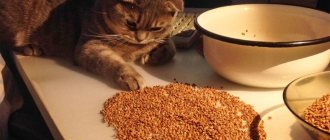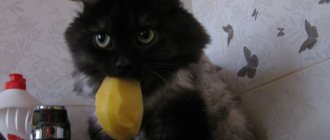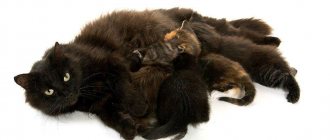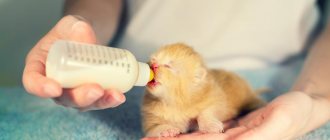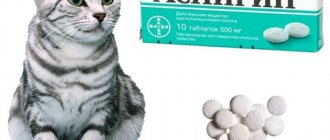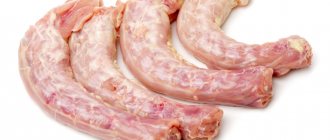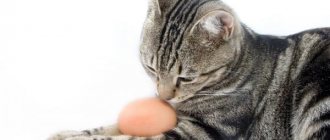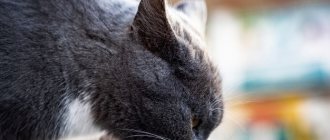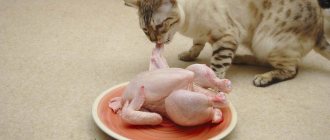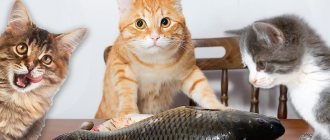Inexperienced owners of four-legged pets often wonder whether cats can be given milk. In this case, experts are unanimous that feeding cats with milk is prohibited, since they do not produce lactose to digest milk sugar.
But this is not typical for all cats. It's like a person is allergic to strawberries, some have it, some don't. Likewise among representatives of the cat world, some cats will drink milk every day and enjoy it, while another, after such joy, may not have time to run to the toilet, since the milk will cause her an attack of diarrhea.
Nutritional features of kittens
To answer the question whether a kitten can be given milk, you need to understand how its digestion works. From a scientific point of view, cats fall into the following categories:
- Class: Mammals;
- Squad: Predatory;
- Family: Felines.
Nature has provided that the best nutrition for a newborn kitten is its mother's milk. A mother cat, like a true mammal, feeds her babies with milk for up to 3 months. During this time, a special enzyme, lactase, is produced in the kittens’ small intestine, which allows them to digest lactose (milk sugar).
When the kitten is 1 month old, the mother begins to gradually introduce him to solid food. They try meat, but breastfeeding does not stop. We must not forget: cats are predators. The kitten's body is growing and preparing for adulthood. Instead of lactase, proteases begin to be produced - enzymes responsible for the breakdown of proteins.
By 3 months, the cat has finished breastfeeding the kitten, and it can be given meat food. Lactase is no longer produced because there is no need for milk.
Note: in very rare cases, the gastrointestinal tract of adult animals may retain the ability to produce small amounts of lactase and digest milk.
The most famous brands of milk powder and infant formula
Powdered cat milk replacers can be found in pet stores or ordered online. The most famous brands of mixtures are always available for sale, among which you need to choose the most suitable one. The owner needs to know which milk substitute to choose and how to prepare it.
Royal Canin
Royal Canin Babycat Milk cat milk replacer is rightfully considered the best formula for feeding newborn pets. The product is available in 300 g jars.
The finished kit includes 3 bags of powdered milk weighing 100 g each, as well as a measuring spoon, a bottle with divisions, 3 nipples with holes of different diameters and instructions. The mixture is also available in separate sachets. On average, 1 sachet lasts for 4–5 days, so it is advisable to buy several cans at once.
Important! An opened bag can be stored for no longer than a month.
This substitute can be fed to animals from birth to 2 months. Royal Canin - milk for kittens, containing a large amount of vitamins, minerals, fiber, proteins, amino acids, omega-3 and omega-6 fatty acids, fructooligosaccharides, taurine, biotin, choline, eicosapentaenoic and docosahexaenoic acids (EPA and DHA) and other nutrients substances necessary for the life and health of a growing kitten.
To prepare the mixture, you need to take 1 scoop of dry powder and dissolve it in 20 ml of clean boiled water. This proportion is observed if it is necessary to drink a larger volume. The mixture must be thoroughly mixed until smooth, so that there are no lumps left. Can only be used within an hour after preparation.
Royal Canin milk formula ensures healthy growth and full development of the nervous system, heart, blood vessels and vision of kittens. When looking for a cat milk substitute, many people choose this product.
Royal Canin Babycat Milk causes allergies in some kittens, so you need to carefully monitor their well-being and contact a veterinarian at the first sign of discomfort. If you are allergic to the mixture, you need to replace the product.
Additional Information! You can make a hole in the nipple yourself. The main thing is that it is not too large: kittens swallow air - this leads to choking, problems with the gastrointestinal tract, pneumonia and other dangerous conditions.
Royal Canin
Beafar
The most famous brand of formula for kittens is Beaphar Kitty Milk. It is easy to find in almost any pet store. This substitute is fed to newborn kittens up to 35 days old and added to the diet of older babies, pregnant cats and pets who have undergone a serious illness or surgery.
The composition includes essential vitamins, amino acids, minerals, fats, and trace elements. Beafar is a mixture for kittens, which is available in packages weighing 200 g. It is a white powder with a yellowish tint and a sweet smell. The package contains a measuring spoon and preparation instructions.
To prepare milk, you need to take three measuring spoons of the mixture and 50 ml of clean boiled water and mix thoroughly. The spoons should be full, but not heaped; excess powder should be poured off. The milk must be mixed well and shaken so that no lumps remain. It should not be watery, otherwise the kittens will not receive enough nutrients and will remain hungry. There is sediment on the bottom and walls of the cup in which the product is prepared, so the cup must be rinsed after cooking.
Important! The finished mixture should be stored in the refrigerator for no longer than 8 hours.
Beafar milk formula has some disadvantages. It can cause constipation, gas, and bloating in kittens. Many young animals are allergic to this mixture, then they have to look for an analogue. There are even cases of death from poisoning. It happens that babies experience attacks of hypoglycemia due to lack of nutrients. As a rule, this occurs at 2–3 weeks of feeding.
In stores you often come across counterfeits of the Beafar mixture and low-quality batches. But in general, most kittens tolerate feeding this mixture well. If possible, you should choose other brands of cat milk replacer, but if there is no choice, then, as a last resort, you can give Beafar to kittens.
Beafar
Jimpet
Gimpet Cat-Milk is a milk enriched with vitamins and taurine. It is rich in proteins and fats, contains many minerals, amino acids, proteins, fatty acids, biotin, arachidonic acid. The mixture will provide high-calorie nutrition to newborn kittens, pregnant and lactating cats, sick and weak animals. Nutrients have a beneficial effect on the heart muscle, nervous system, vision, gastrointestinal tract and animal fur.
Jimpet is produced in the form of cans weighing 200 g. To prepare milk, you need to dissolve 1 tablespoon of the dry mixture in 3 tablespoons of hot, clean water. Gimpet cat milk replacer is suitable for feeding kittens from birth to 4 weeks.
Additional Information! Jimpet milk formula is suitable for feeding large breed kittens and wild cats.
Jimpet
Other
In addition to the most famous brands of dry milk formula for kittens, there are other equally high-quality products.
Nutri-Vet Kitten Milk will provide newborn kittens and pregnant cats with all the beneficial substances. Cat milk replacer contains 42% protein, 25% fat, proteins, biotin, as well as all vitamins and minerals. The finished product can be stored in the refrigerator for no longer than a day. This mixture is easily absorbed by the kitten’s fragile and delicate body.
Kittenmilch CdVet is not just a cat milk replacer, but a complete product that additionally contains colostrum. This makes Kittenmilch CdVet much more nutritious than many other formulas. It contains a complete complex of nutrients, vitamins and minerals that a kitten needs. This mixture can be fed to newborn kittens and pregnant cats. Unfortunately, Kittenmilch CdVet is very expensive and hard to find.
Other substitutes are also known: Canina, Dolfos, Clauder's, Gimborn, Hartz, Trixie, Vo-Toys, Camon.
Kittenmilch CDVet
How to tell if your cat is lactose intolerant
The main symptoms of lactase deficiency in cats are painful bloating, diarrhea and vomiting. Most often, unpleasant symptoms appear 8-12 hours after the animal consumes milk.
The following mechanism works in the cat’s body: she drinks milk, but lactose is not broken down by lactase and passes through the small intestine undigested. Next, milk sugar attracts water and ends up in the large intestine, where bacteria try to process it. At this time, carbon dioxide, hydrogen and other substances that cause fermentation are released.
Is it possible to give cow's milk to a kitten?
When thinking about whether to treat your kitten to milk, you should clearly understand that the composition of cow's milk is significantly different from cat's milk. It is cat's milk that contains the optimal amount of nutrients for the full development of the baby.
So, cat's milk consists of 8% protein, and cow's milk - 3.5%. The fat content of the former is also higher on average - 4.5% versus 3.3%. And this is not to mention vitamins and minerals.
The problem with milk from the store is its quality.
- When raising cows, antibiotics are used, which then end up in the milk and can lead to dysbacteriosis.
- If the milk comes from a pregnant cow, it will have a higher estrogen content, which can cause hormonal imbalance in the kitten.
- The plants that the animal ate may have been treated with pesticides. Standards for toxic substances are calculated for people, but not for tiny kittens.
- Store-bought milk is pasteurized, which reduces its nutritional value.
- In addition, cow's milk protein is a strong allergen.
Giving cow's milk to a kitten can be downright dangerous!
Theoretical arguments and life facts about milk
You may come across rather aggressive recommendations from “experts” regarding the presence of milk in a cat’s diet. In fact, in the process of communicating with an expert aggressor, it turns out that the person knows cats only in theory, owns an animal with lactose intolerance, or is a “fanatic” who strictly follows instructions. So, the main arguments about the dangers of milk:
- Be sure to give the kitten milk, and at 4 months exclude it
and never return it - all adult cats develop intolerance to milk sugar (lactose).
- An adult cat can have cottage cheese, kefir, fermented baked milk, yogurt, but not sour cream, because it is fatty.
All products are relevant for the tailed menu, with only one caveat, if the food is natural, that is, not store-bought. Industrial cottage cheese made from milk powder and starch, kefir with a huge amount of preservatives, yogurt with questionable flavors are unlikely to benefit your pet. The same goes for cheese - the product is very healthy if it is natural. Sour cream is an acceptable product, but in small quantities, since milk fats actually weaken the intestines.
- If you give milk to cats, they will definitely have it.
Not necessarily, not for everyone and not always. A sharp reaction is observed only in animals with lactose intolerance.
- Milk is harmful to cats, it is a natural poison!
A very dubious statement that has never been supported by research and sufficient facts. Again, we are talking about tailed animals that do not digest lactose. By the way, some people are lactose intolerant, and when drinking milk they experience digestive upset (quite severe). However, there is no talk of “toxicity”.
We've dealt with the arguments of the milk haters, now let's think about the facts. How many animals, especially in rural areas, receive milk every day? And a long-faced, lazily licking cat with a milky mustache sits on the fence, not even suspecting that, you see, they are trying to poison him. Homemade sour cream and cottage cheese are also present in the purring diet and the tailed ones eat as much as they want, and not strictly about. If cats can’t have milk, why is the “rural gene pool” of four-legged animals the strongest? Why do they get sick less and live longer?
It is quite difficult to call cats stupid, so this is how it is possible that an intelligent animal, guided by survival instincts, asks for milk and drinks it with ecstasy. Why do rural cats come to the barn and demand their “share” strictly during milking of a cow or goat? The only conclusion that suggests itself is that it’s all about the individual characteristics of each cat. In addition, you need to consider whether the animal is purebred. Many purebred purrs, by the will of man, sacrificed their versatility in favor of an attractive appearance. Would animals with food allergies or sensitive digestion survive in the village, eating mice, less often birds, and whatever their owners provide? Definitely not! This is where the aggression of experts stems from, who recognize only purebred and “problem” cats; they judge from their own experience, but is it worth infringing on a pet based on conclusions about another animal?
Goat and sheep milk
It must be admitted that goat and sheep milk is less allergenic than cow milk. If an adult cat has an intolerance to cow's milk, but you really want to treat it with milk, then this will be a good replacement.
As for kittens, ruminant milk does not cover their nutritional needs. Proteins and fats will not be enough, and, as a result, a kitten fed with goat's or sheep's milk will grow and develop slowly.
The lactose content in the milk of goats and sheep is higher than that of cats. Although kittens produce lactase, it is designed for cat milk.
Reviews from veterinarians and cat owners about feeding milk and fermented milk products
The Lord created milk for small children, kittens, puppies, etc. To digest milk, you need to have special bacteria in the intestines and stomach that do this work! I was very surprised when I once read the statistics that 70!!!!!! out of 100 adults can no longer drink milk! And this is not a pathology, but a norm, bacteria should disappear with age.. But this does not necessarily HAVE to happen, so the one who can digest it, let him drink to his health!! There is a mountain of calcium and other useful substances! And those who cannot digest it can drink fermented milk products, yogurt, kefir, etc…. This applies to both people and animals!! If the kitten does not suffer from diarrhea from milk, at least let him drink himself!! Otherwise, pamper yourself with some kefir! A young body really needs calcium to grow and have strong bones!!
Loshakoshkina's mother
https://www.catgallery.ru/forums/index.php?showtopic=8478
From dairy products, I give my cats fermented baked milk, 10% cream “House in the Village” and from time to time goat milk 2.5%.
Asia
https://mauforum.ru/viewtopic.php?p=605779
Dairy products are needed by cats on a natural diet. But it doesn't have to be milk. Cottage cheese, low-fat kefir, and yogurt are good. Milk can cause diarrhea in an adult cat. If this is not observed, then you should not deprive the kitten of a bowl of milk. Personally, my cat prefers milk to kefir - and you can’t argue with him. Offer other dairy products, let him choose. But this is only if you don’t decide to transfer it to industry. feed where the addition of milk may cause a nutritional imbalance.
Lady
https://forum.33cats.ru/index.php?topic=44.0
Dairy products should not be mixed with meat; they should be given as independent feeding; it is recommended to mix them only with vegetables, cereals, and eggs. As a result, we get generally accepted recommendations for feeding KMP: the daily norm of fermented milk products for an adult animal is 40–80 g fat content no more than 9%; the interval between feeding meat products is approximately 4 hours.
Cupid
https://www.britishcat.ru/forumnew/printthread.php?t=11049&pp=40
The experience of using it is positive, but we often use 3.5% HYLA UHT milk, less often 1.5% and sometimes at the request of the cat (we are “Siberians”) Lactose-free milk Valio Zero Lactose 1.5%. The taste is slightly sweet, but this is a cost because... “The lactase enzyme added to milk breaks down milk sugar (lactose) by 80%, i.e. hydrolyzes into easily digestible simple sugars glucose and galactose.” We also use it for food because... we have “indigestibility of ordinary milk”. From time to time I give my cat Natural Acidophilus Yogurt HYLA and Cottage Cheese HYLA 0.3%, also produced by Valio. The cat stopped making loose stools on dairy products of this production and type. Before this, we suffered a lot with goat milk, and he even refused to drink regular milk himself until I decided to share with him the HYLA I bought for myself.
Mirri_Mi
https://mauforum.ru/viewtopic.php?f=133&t=15549&sid=76b351ad89172528700fa9fc5fab35cf&start=10
For a kitten separated from its mother (and for normal development they must suckle for up to 2 months, and cow’s milk cannot replace cat’s milk), it is better to give not milk, but fermented milk products without sugar and all sorts of additives: kefir, natural. Yogut, cottage cheese (preferably soft so that you can lick it), you can add raw or boiled chicken yolk, or a whole quail egg to these products 1-2 times a week (3-6 times a week)
Jasmine
https://forum.bolen-kot.net.ru/index.php?showtopic=12824
There is an analogue of cat milk. Not an analogue, of course, but the pros feed kittens with this mixture. 100 g cream, 1 chicken egg yolk, honey on the tip of a knife or 5% glucose. This mixture is given to kittens and cats as needed. I used it and didn't see any problems. Another analogue is goat milk. Only whole and not the fattest. There is another solution: Royal Canin - powdered milk formula. Fully adapted and I have not yet seen better nutrition for kittens up to a month old. all this fuss is good when kittens do not have a mother and her milk. and so, well, unless you want to tinker. or you have your own goat in the yard. in fact, they need to learn something from something. not on the water
